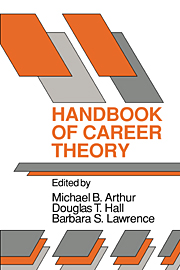Preface
Published online by Cambridge University Press: 05 June 2012
Summary
Back in the early 1970s, there was no established “field” of careers in organization and management studies. Tim Hall recalls that it was fun when he and a small band of organizational scholars, who viewed themselves as being on the cutting edge of theory, who liked to work on somewhat offbeat topics, and who would rather challenge than defend the academic “establishment,” embarked on their career studies. Anyone interested in examining the long-term issues associated with working in organizations was really on his or her own to find useful theory and research in a number of relevant social science disciplines, such as psychology, sociology, political science, economics, and anthropology. To do good research, you had to scan and learn from a number of disciplines and you had to develop your own theoretical ideas. In organizational terms, the scholarly environment in which we operated was complex, dynamic, and nonroutine.
The down side of all this was that sometimes you wondered who your audience was. Many questions gnawed away at you: Is anyone out there interested in this “career stuff?” What journals would possibly publish papers on careers? Who is in my reference group? Everyone I trade papers with is in a psychology, sociology, or education department. Yet I work in a business school. Am I in the right place? But you had a sense that it was all new. And you knew it was important as you saw more and more evidence of the long-term influence of careers on individuals, the institutions in which they worked, and the societies to which they belonged. There was a sense of being on the “ground floor” of something important.
- Type
- Chapter
- Information
- Handbook of Career Theory , pp. xv - xxPublisher: Cambridge University PressPrint publication year: 1989
- 1
- Cited by



